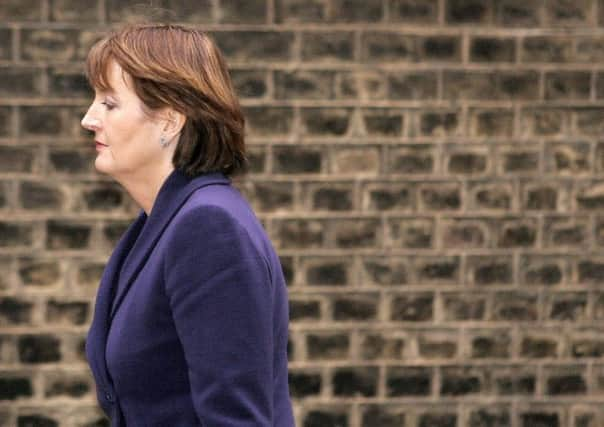Dani Garavelli: Apology isn’t issue in Harman row


It seemed so outrageous that the Daily Mail, which makes its money peddling sexual exploitation, should accuse a feminist and human rights campaigner of being an apologist for paedophilia, I could barely countenance the possibility that any of its allegations might be legitimate.
Even when Harman gave her Newsnight interview and declined to apologise for the PIE’s affiliation with the NCCL, of which she was once legal officer, I was on her side. Perhaps I’m predisposed to like prickly women who stick to their guns, but I read in her refusal to say sorry not an attempt to evade responsibility, but a conviction that the group had no bearing on her work and a reluctance to do what was politically expedient. In any case, everything she said seemed eminently reasonable. She didn’t join the organisation until 1978, two years after her now husband, MP and trade unionist Jack Dromey, had “marginalised” PIE, and the only vaguely relevant motion she had backed was an eminently sensible one calling for the age of consent for homosexual sex to be lowered.
Advertisement
Hide AdAdvertisement
Hide AdWhen it came to why she and her Labour colleagues – Dromey and former Cabinet minister Patricia Hewitt, who was the NCCL’s general secretary from 1974 to 1983 – didn’t take more of a stand against its views, I was prepared to be open-minded. I didn’t accept that the 70s was a different era when paedophilia was off the radar and the rights of individuals to sexual self-determination were seen as paramount. But I could see how the NCCL, whose raison d’etre was the protection of people’s freedoms, might find it hard to ban affiliated groups just because the views they expressed were odious. We experience similar contradictions today every time we accept Muslim fundamentalists have the right to rail against the West or that the BNP has a right to field candidates in elections. How easy it would have been for progressives types back then to convince themselves that even paedophiles have a right to express their views.
There came a point however, as the story unfolded, where it was no longer possible to ignore that something was seriously awry at the NCCL in the late 70s. Far from PIE’s existence being borne through gritted teeth, the group seemed to have wielded a fair amount of influence. Harman’s call to water down a proposal for a ban on explicit photos of children was infuriatingly ambiguous: Was she supporting child pornography or merely trying to protect parents who take innocent shots of their children in the bath? But there was no doubt when it came to Hewitt backing a motion in favour of lowering the age of consent to 14 (and ten in some instances) and legalising incest. Nor was there any denying that PIE’s former leader Tom O’Carroll sat on an NCCL gay rights sub-committee in 1979, the year after Harman became its legal officer, or that she was quick enough to attack the BBC for its failure to act on reports about Jimmy Savile’s predilections.
It is true PIE was cunning. It recognised the 1970s as an era when old social mores were questioned and it piggy-backed on other groups – in particular the gay rights movement – to gain credibility. By conflating the two issues, its members seem to have been able to pass themselves off as a legitimate sexual minority, not only to the NCCL but also to the then Tory government which, it has been claimed, may have given funds to the organisation.
Of course, this is no excuse for having allowed PIE to retain its links with the NCCL until 1983, just a year before it was finally disbanded. However manipulative PIE members were, it should have been possible for Harman et al to distinguish between the rights of consenting adults to engage in once-criminalised sex acts and preying on children. They should have recognised that four, ten and even 14-year-old children were incapable of making any kind of informed decision on sex and exposed PIE for what it was: a bunch of perverts trying to hide their true identities underneath a veneer of respectability.
After all, not everyone tolerated their views: though paedophilia was not a term widely used in those days, plenty of people were appalled at what PIE stood for. Its leaders were prevented from speaking at several universities. Polly Toynbee spoke of the “disgust, aversion and anger” it invoked in her, and headmaster Charles Oxley eventually infiltrated its ranks to prove its members were indeed practising what they preached.
Reluctantly then, I have to concede the Daily Mail story is more than just a smear and that Harman should probably join Hewitt in apologising. Yet if the exposé serves only to tarnish the reputation of three people who have contributed to the campaign for equality then it’s still a pretty pointless and vindictive exercise. Instead the story should serve as a starting point for an exploration of the climate that allowed so many people in the 70s to take collective leave of their senses and an investigation into figures who may have helped PIE gain access to the corridors of power, in an attempt to make sure nothing like it ever happens again. Then, and only then, will the newspaper be able to say that its muck-raking is genuinely in the public interest.
Twitter: @DaniGaravelli1